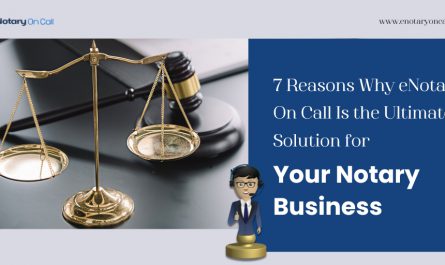As a caregiver, you wear many hats—coordinating medical appointments, managing medications, or ensuring your loved one receives the best care possible. One of the more stressful tasks is navigating the legal requirements for managing their affairs, such as securing a Power of Attorney (POA). But did you know that 90% of caregivers now prefer online notarization to complete this critical process?
In a world where time, convenience, and safety are paramount, online notarization has revolutionized how caregivers handle elder law documents like the POA. Below, we’ll explore why this trend is taking off and how you can benefit from it.
The Shift Toward Online Notarization
The COVID-19 pandemic was a key driver in accelerating the adoption of online services, particularly in legal and administrative sectors. According to a study by the National Notary Association, there was a 600% increase in the use of online notarization platforms in 2020 alone. This shift isn’t just a temporary trend—it’s a permanent change reshaping how legal documents are managed.
In fact, 21 states now have permanent laws allowing online notarization, while others are moving toward this model of completing a notarization from anywhere with a secure internet connection, which has proven to be a game-changer for those managing complex legal matters—especially caregivers.
You may also like to read – Unveiling the Process: How to Become a Successful Remote Online Notary
Why Caregivers Are Choosing Online Notarization: Key Factors!
The following are some key factors:
#1. Convenience: No More Scheduling Hassles
Caregivers often face tight schedules, balancing their own work and family lives with the needs of an elderly loved one. The traditional route of notarization—finding a local notary, scheduling an appointment, and traveling to meet in person—can quickly become an obstacle.
According to an AARP Public Policy Institute survey, 70% of caregivers report adjusting their work schedules to accommodate caregiving duties, including managing legal and financial responsibilities.
Onliation removes the need for travel, allowing you to complete the process:
- From the comfort of home or any location.
- At any time, thanks to 24/7 availability on notarization platforms.
- Without rearranging your schedule or taking time off work.
For instance, eNotary On Call, one of the leading online platforms, allows users to connect with a licensed notary in less than 15 minutes. This is a huge time-saver compared to the days or weeks it could take to schedule an in-person appointment.
#2. Speed: Same-Day Processing
When it comes to legal documentation, time is often of the essence. If your loved one is ill or requires immediate decisions regarding healthcare or finances, you can’t afford delays in notarization.
With online notarization, documents can be signed, notarized, and legally binding within minutes. Compare that to the traditional notarization process, which can take several days due to travel, scheduling, and document delivery. This speed is critical when managing sensitive elder law matters.
For example, a case study from Pew Research highlights a scenario where an elderly woman needed an urgent POA notarized for a medical decision. The entire process took under an hour through an online platform—something that would have taken at least a day using traditional methods.
#3. Safety: Secure Process
Health and safety are ongoing concerns, especially for elderly individuals who are more susceptible to infections or diseases. During the COVID-19 pandemic, in-person notarization posed significant health risks. Even in a post-pandemic world, minimizing exposure for vulnerable individuals remains a priority.
With online notarization, the process is entirely remote:
- No need to visit public places or interact face-to-face.
- Completely contactless, reducing health risks for caregivers and their elderly loved ones.
- Security features like multi-factor authentication and identity verification ensure the notarization process remains safe and compliant with legal standards.
In a National Law Review article, a notary professional cited that online notarization reduces the risk of fraud by adding digital safeguards such as video recording, which can be replayed to confirm the legitimacy of the notarization.
You may also like to read: Easy Guide: How to Get a Notarized Minor Travel Consent Form
#4. Affordability: Cose Solutions
Did you know that online notarization is often more affordable than traditional notarization? Many platforms offer lower fees due to the streamlined digital process. While traditional notary services may charge anywhere from $25 to $100 per document, online services like eNotary On Call offer packages starting at around $25 per notarization.
Additionally, online notarization costs associated with travel, mailing documents, or making multiple trips for errors or additional signings. This is especially beneficial for caregivers juggling financial responsibilities related to medical care, living expenses, etc.
Real-World Examples of Online Notarization Success
Case Study: The Williams Family
Julie Williams, a caregiver for her elderly mother, needed to get a POA document notarized to manage her mother’s finances. The traditional process would have involved a 2-hour trip to a local notary and several days of back-and-forth paperwork. Julie opted for online notarization instead. “I logged on at 10 PM, spoke with a notary from eNotary On Call within minutes, and had the POA completed that same night. It was such a relief,” she said.
How Does Online Notarization Work?
If you’re here to take advantage of this process, it’s simpler than you think:
- Upload Your Document: Scan and upload your Power of Attorney document to the notarization platform.
- Verify Your Identity: The notary will verify your identity through secure methods like government-issued ID and video verification.
- Connect with a Notary: In a live video session, you and your loved one (if applicable) will sign the document while the notary witnesses.
- The document is Notarized: The notary will electronically apply their seal, legally binding the document.
Legal Recognition: Is Online Notarization Legit?
You may wonder if online notarization holds the same legal weight as traditional notarization. The answer is yes—in most states, online notarization is fully recognized and legally binding. The process is governed by laws such as the Uniform Electronic Transactions Act (UETA) and the Electronic Signatures in Global and National Commerce Act (ESIGN).
As of today, 40 states have implemented online notarizations, with more states updating their laws.
Why Caregivers are Adapting the Change: A Recap!
- Convenience leaves home or rearrange your schedule.
- Speed: Same-day notarization without the hassle of waiting.
- Safety: Complete the process contact-free, protecting your loved ones.
- Affordability: Lower fees and no additional travel costs.
- Legally Recognized: Your online notarized document is as valid as an in-person notarization.
Conclusion
With 90% of caregivers now opting for online notarization, the reasons are clear: it’s fast, convenient, safe, and cost-effective. Managing elder law documents like Power of Attorney has never been easier, allowing caregivers to focus on what truly matters—the well-being of their loved ones.
Is online notarization right for you? If you’re looking for a more straightforward, more efficient way to handle legal documentation, why not try? eNotary On Call offers secure, fast, and convenient notarization services that can be completed from the comfort of your home. Reach out to us today and see how we can help you easily complete your elder law documents. Visit eNotary On Call to get started, or contact us for more information!



